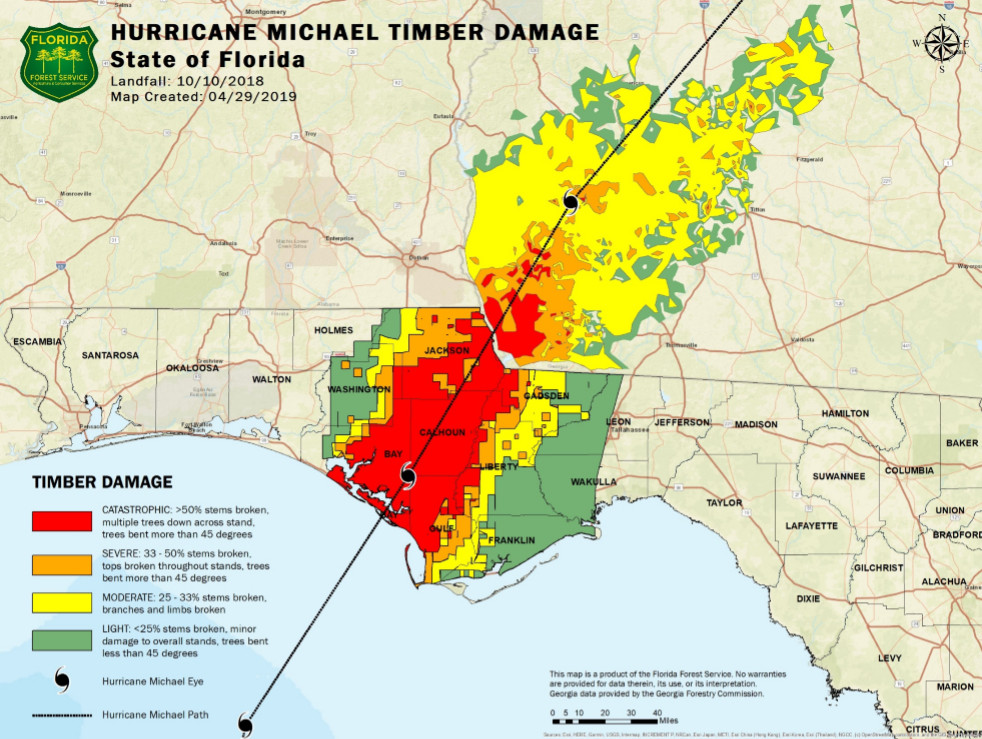Hurricane Michael recovery & new elevation recs.
First-ever disaster aid for Florida’s timber industry hit hard by Hurricane Michael, paying for more power lines to prevent outages in future storms, reforming FEMA’s disaster contracting, and a new report urging Florida’s future coastal homes be elevated another foot. It’s all in this wrap-up of emergency and disaster management news.
 Hurricane Michael Recovery: Subject-specific federal disaster grants have never been given out to the timber industry until now. Florida is getting $381 million to help timber growers and farms in the Panhandle decimated by the 2018 Category 5 hurricane. 500 million trees, sitting on 2.8 million acres of timber were damaged, representing 4.4 years of annual harvests, with a value of $1.3 billion. Crop insurance for trees isn’t common and these family farms don’t have money to replant and wait ten years for the next crop. The question now: How long will it take for the checks to go in the mail?
Hurricane Michael Recovery: Subject-specific federal disaster grants have never been given out to the timber industry until now. Florida is getting $381 million to help timber growers and farms in the Panhandle decimated by the 2018 Category 5 hurricane. 500 million trees, sitting on 2.8 million acres of timber were damaged, representing 4.4 years of annual harvests, with a value of $1.3 billion. Crop insurance for trees isn’t common and these family farms don’t have money to replant and wait ten years for the next crop. The question now: How long will it take for the checks to go in the mail?
Underground Power Lines: The Florida Public Service Commission is moving forward with its plan to fund a greater number of underground power lines, implementing a law passed by the legislature following Hurricanes Michael, Irma, and Hermine. The commission last week overcame objections from the state Office of Public Counsel and others that a change in the funding formula would allow for “double recovery” and “inflated” costs being passed along to consumers. Although utilities will file 10-year plans on such storm protection, they’ll file annually for approval to charge customers for those projects. Past projects have been funded through base electric rates, which are set for a number of years.
FEMA Contracting Accountability: The U.S. Senate has passed the Federal Advance Contracts Enhancement Act (FACE), sponsored by Florida Senator Marco Rubio. The bill would require FEMA to follow recommendations from the U.S. Government Accountability Office (GAO) on advance contracts to “ensure that federal preparedness actions are coordinated to prevent gaps in recovery efforts from occurring.” FEMA relied heavily on advance contracts to quickly mobilize resources to affected areas in the aftermath of Hurricanes Harvey, Irma, Michael, and Maria, as well as the 2017 California wildfires. GAO reviewed the program afterward and made nine recommendations to improve contract handling. The bill now goes to the U.S. House.
Florida’s Building Code & Rising Sea Levels: The Florida Building Commission is reviewing a summer report it commissioned that among other things, recommends changing the state building code to elevate new coastal structures another foot to counter sea level rise. The Florida International University study also recommends a region-specific sea level rise curve updated every 5 years and requiring state review of groundwater maps before allowing septic tank installation due to recent failures from rising groundwater. Elevating a single foot could reduce annual flood insurance premiums 17%. A second foot could cut 37% off a premium. Homebuilders say the extra cost involved would hurt affordable housing efforts; advocates say the insurance savings would eventually pay for it. The last change to the state building code three years ago required new structures be elevated an additional foot.
LMA Newsletter of 11-21-19

